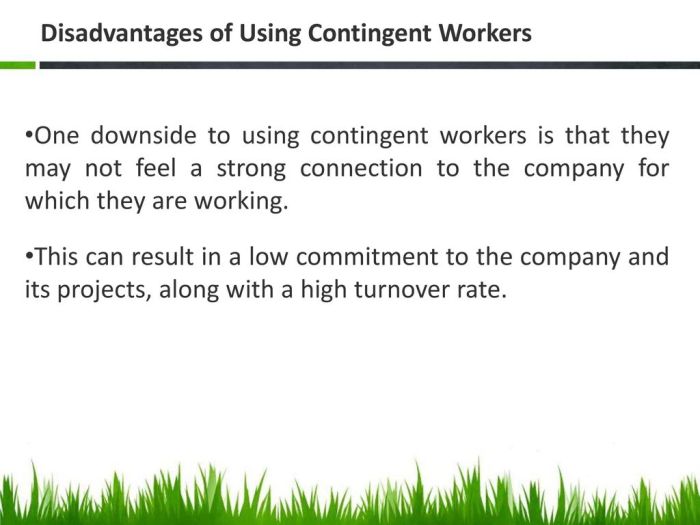One potential disadvantage of using contingent workers is that: – One potential disadvantage of using contingent workers is that it can impact business operations in several ways. These impacts can range from operational challenges to financial consequences, making it crucial for businesses to carefully consider the potential risks before engaging contingent workers.
Contingent workers, also known as temporary or contract workers, are individuals who are hired on a short-term or project-based basis rather than as permanent employees. While they offer flexibility and cost-effectiveness, their use can also introduce certain challenges that businesses need to be aware of.
Contingent Workers’ Potential Disadvantages: One Potential Disadvantage Of Using Contingent Workers Is That:

Contingent workers, also known as contract workers or freelancers, are individuals who are hired on a temporary or project-based basis. While contingent workers can provide businesses with flexibility and access to specialized skills, their use also comes with potential disadvantages.
One of the main disadvantages of using contingent workers is the potential for higher costs.
Examples of Potential Disadvantages, One potential disadvantage of using contingent workers is that:
- Contingent workers typically receive higher hourly rates than permanent employees, as they do not receive benefits such as health insurance or paid time off.
- Businesses may also incur additional costs for training and onboarding contingent workers.
- Contingent workers may not be as invested in the company’s success as permanent employees, which can lead to lower productivity and quality of work.
Another potential disadvantage is the lack of control over contingent workers.
Impact on Business Operations
- Businesses may have less control over the quality of work produced by contingent workers.
- Contingent workers may not be subject to the same performance standards as permanent employees.
- Contingent workers may not be available when needed, which can disrupt business operations.
Q&A
What are the potential disadvantages of using contingent workers?
Contingent workers may not have the same level of commitment or loyalty as permanent employees, leading to higher turnover rates. They may also require additional training and supervision, which can increase costs. Additionally, contingent workers may not be eligible for the same benefits as permanent employees, which can impact morale and productivity.
How can businesses mitigate the potential disadvantages of using contingent workers?
Businesses can mitigate the potential disadvantages of using contingent workers by carefully screening and selecting candidates, providing clear job descriptions and expectations, and offering competitive compensation and benefits packages. They should also develop clear policies and procedures for managing contingent workers and ensure that they are integrated into the organization’s culture.

